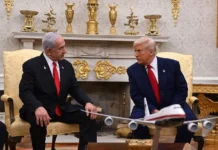U.S. President Donald Trump’s plan to significantly reduce the number of American troops stationed in Germany has been causing ripples even among Republican lawmakers, who are—and not for the first time—expressing concern that the present administration cares little for maintaining the Western alliance formed at the end of World War II.
A June 22 letter to Trump signed by six Republican representatives, including Michael McCaul, the Ranking Republican Member of the House Foreign Affairs Committee, argued that reducing the number of troops in Germany would fail to meet two expressly stated objectives.
Firstly, a reduction would be unlikely to convince the German government that it should make good on its pledge spend 2 percent of its gross domestic product on defense, as agreed at the NATO Summit in Wales in 2014. This reluctance to spend, of course, lies at the root of Trump’s ire with Germany, as well as with other European members of the NATO alliance who are deemed not to be pulling their weight in terms of financial contributions.
Secondly, the reduction would place, in the words of the letter, “U.S. strategic interests at risk.” Urging Trump to reconsider his decision, the letter concluded that “the United States should continue to lead by example and remain fully committed to the NATO alliance, which has successfully deterred the outbreak of another costly world war on the continent since its formation. It is irrefutable that a peaceful and prosperous Europe is in the interests of not just our European allies and partners, but also the United States.”
This is not the first time that an American president has mooted the prospect of a diminished military presence in Germany. In the period of 30 years that witnessed the end of the Cold War and then the resurgence of Russian militarism under Vladimir Putin’s regime, Europe’s frontline moved eastwards from Germany to those countries with a land border with Russia, among them Poland and the Baltic nations (all NATO members), and Ukraine and Georgia (NATO allies who have nonetheless endured Russian military aggression during the last decade.)
Former President Barack Obama—never one to get sentimental about European allies either—also faced criticism when he decided in 2011 to reduce the number of U.S. Brigade Combat Teams, each comprising 4,000 soldiers, that were based in Germany. Obama did this over the advice to the contrary of Adm. James Stavridis, then the commander of U.S. forces in Europe, and the objections of members of Congress. One of Obama’s critics at the time, the late Indiana Republican Sen. Richard Lugar, expressed almost the same fear that Trump is being confronted with today. If Obama reduced U.S. troop numbers in Europe, Lugar said, that would raise uncertainty over America’s “commitment to NATO allies, especially at a time when many NATO allies have questioned U.S. engagement on the European continent.”
These same questions have intensified under Trump, in part because of the combative, dismissive rhetoric he has employed when making the case that the other members of NATO have taken shameless advantage of America’s financial largesse. Defenders of the president’s approach have also made the strategic argument that the U.S. troop presence in Germany is a relic of Cold War days and unnecessary in an era of drone warfare, electronic and cyber warfare, and targeted airstrikes. And following the visit of Polish President Andrzej Duda to the White House last week, they can also argue that the issue is less about reduction, and more about redistribution, as some of the troops withdrawn from Germany will be restationed in Poland.
“Poland is one of the few countries that are (sic) fulfilling their obligations under NATO, in particular their monetary obligations,” Trump said at his joint press conference with Duda. “They’ll be paying for the sending of additional troops, and we’ll probably be moving them from Germany to Poland.” That is a sound economic argument for some people at least, but does it have strategic value? Given that we are talking about slightly less than 10,000 troops and that no details have been forthcoming about their relocation, it’s hard to see how such a move would deter further Russian ambitions westwards.
Moreover, Trump has had a sour relationship with the government of Angela Merkel in Germany and a much better one with Poland, presently governed by conservative nationalists who are predicted to win comfortably in this weekend’s national elections. So there’s a case to be made that political considerations unrelated to national security are among the drivers of this decision.
Yet the critical underlying factor in the dispute over U.S. troops in Germany isn’t really about numbers and locations. It’s about Trump’s attitude to the Western alliance. When he has read from scripted speeches, Trump has reiterated America’s historic commitments. But when he has sounded off on his own volition, he has made clear his view that America is essentially doing the Europeans a favor by looking after their security, which has less and less to do with our security.
When Trump held a summit with Russian President Vladimir Putin in 2018, the late, much-lamented Sen. John McCain lambasted him for his remark that the United States and Russia were equally responsible for the deterioration in their bilateral ties, along with his shielding of the Russian dictator from questions about Moscow’s interference in the 2016 U.S. election. “The damage inflicted by President Trump’s naiveté, egotism, false equivalence, and sympathy for autocrats is difficult to calculate,” McCain said in July 2018, a little more than a month before he passed away. “[T]he president made a conscious choice to defend a tyrant against the fair questions of a free press, and to grant Putin an uncontested platform to spew propaganda and lies to the world.”
Trump hasn’t said or done anything since that criticism was leveled to suggest that he would behave any differently now. “To ensure that free and open societies triumph over the likes of Vladimir Putin’s regime and the Chinese Communist Party, the United States must continue to build and maintain a united coalition of like-minded allies,” the six Republicans implored in their letter to Trump on Germany. Sadly, if a U.S. president needs to be reminded of this basic truth, he cannot be particularly wedded to it in the first place.
























